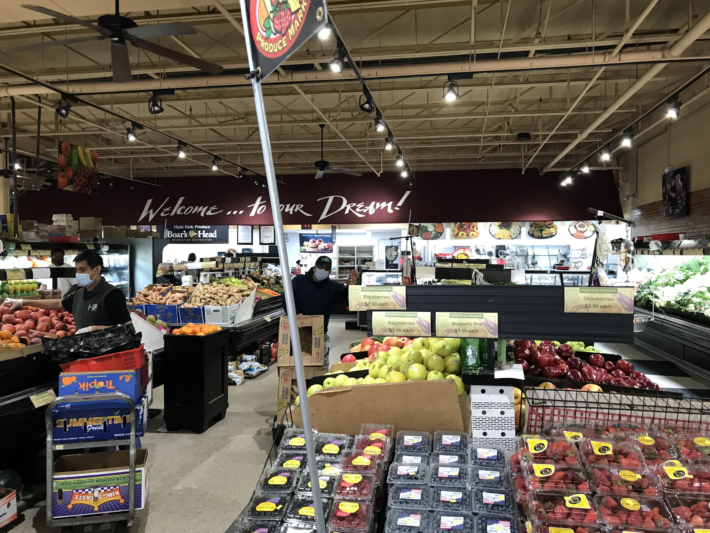By Peter Pu
A cool air sets over people as they enter Hyde Park Produce at the heart of Kimbark Plaza in Chicago. Weaving through the aisles, customers check off green onions from the weekly grocery list, grab a box of Michigan-grown blueberries, or pull out a fruit bar from the freezer near the cash register.
Beyond the pile of peaches, the bin of orange habanero peppers and the row of bok choy, carrots and anise, a maroon sign declares, “Welcome… to our Dream!”
Produce is store owner Larry Damico’s passion. His business has persisted through the pandemic despite social distancing restrictions keeping some customers at home. Damico and other family business owners say the key to thriving has been building relationships in the community and moving sales online.
Damico is the third generation of his family working in produce. As a kid, he loved the ripping and running of South Water Market, where he bought produce, and insisted on tagging along with his father, Yoyo Damico, to deliver produce.
“At 2 o’clock in the morning, I’d wake up in the morning, sleep by the back door, so he wouldn’t leave without me, with my clothes on,” Damico said.
Damico and his father moved to retail when they opened Hyde Park Produce in 1996. Damico still wakes up at 3 a.m., when it’s “daytime” at the market, to buy produce so that his store is stocked fresh for opening at 8 a.m. each day.
Damico said he runs the store like a family. For employees like Luis Vargas and twins Nacho and Lalo Rosas who have been working at the store for 26 years, Damico has watched them and their children grow up.
Front manager Sera Castro sometimes gets dinner or drinks with colleagues outside of work, and he said that people of diverse backgrounds often get along in the store.
During Christmas Eve, Damico hosts a Christmas Eve drinking tradition.
“We sit in the back and we have drinks, and that’s been going on for a good probably 20 years,” Damico said. “We made sure we sit there. We lock the doors at Christmas Eve, and before we all go home, we sit and just have a couple beers with each other and just enjoy each other’s time.”
Ben Garvey, a customer at Hyde Park Produce, said he enjoys chatting with employees as he gets a sandwich.
“We’re kind of buddies,” Garvey said. “There’s a culture to that, so I think that’s pretty cool.”
Damico did not lay off any employees during the pandemic. With social distancing restrictions, the store received five times the number of usual online orders, requiring groceries sent to homes by Mercato delivery service. However, the online shift did not make up for the usual in-person sales.
“You got to have a separate guy pick a new order, and then, the company itself also takes 12% from that sale, so you’re losing in a lot of different ways,” Damico said. “You’re losing customers. You’re losing business, and then, you’re losing on your sales.”
For other businesses like Gilda Designer Thrift Boutique, online sales have been essential for survival through the pandemic. With a focus on sustainability, store owner Gilda Norris curates designer vintage and resale clothes she finds at estate sales. She described her shop as “where fashion meets community” as customers often go to the shop just to see her. The community stayed with her through the pandemic.
“They would purposely buy off my Instagram page and say ‘Gilda, just keep it there until you open up,’” Norris said. “They told me they wanted me to survive.”
Meanwhile, at Wesley’s Shoes, store owner Bruce Wesley said the shift to online sales led to more customers discovering his business. With the closure of competing shoe stores like New Balance and Foot Locker nearby, his sales are double that of 2019.
The selection at Wesley’s Shoes prioritizes comfort with brands like On Running, Ecco, Birkenstock and Hoka One One. Wesley said his sit-and-fit service, the practice of measuring the foot to find the right fit, differentiates his store from others.
“It’s about developing relationships,” Wesley said. “We’ve had customers who have shopped with us, and now we’ve got their children and their children’s children shopping with us.”
As large corporations like Whole Foods and Trader Joe’s open in Hyde Park, Garvey said he specifically supports family-owned businesses like Hyde Park Produce for the culture they bring to the community.
“I really believe in this idea of a business should have a stake in the community,” Garvey said. “There’s culture that comes from that and through that, so large, big box stores like Amazon, which really owns Whole Foods, they just don’t have a stake in the community because they’re not connected.”
